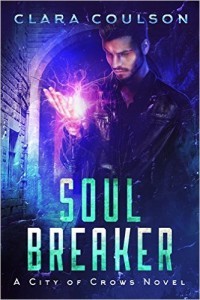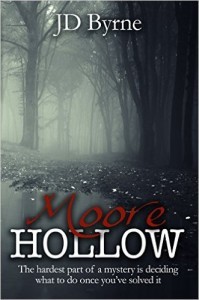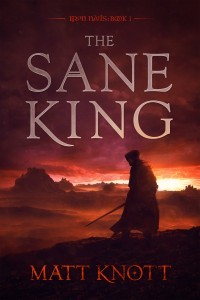Cora Buhlert's Blog, page 102
December 8, 2015
Star Wars Fever
Friday, December 9, 1983, was the day I first saw a Star Wars movie (Return of the Jedi, which had just opened in Germany, since Europe always got Star Wars around Christmas in the time of the original trilogy). And the fact that I can still remember not just the exact date, but even the weekday after thirty-two years, whereas I’d have to look up the exact dates my grandparents died, should tell you how very important this event was for me.
As anyone who doesn’t live under a rock or on an uncharted desert island or currently isn’t stuck on Mars with only potatoes to eat and a few disco records for entertaiment should know, a new Star Wars film – the seventh altogether (discounting the two Ewok movies) and the first since Revenge of the Sith back in 2005 – will arrive in theatres soon. Alas, it won’t open on December 9 – if it had, I would probably have gone to see it on opening day – but on December 17, but that’s still close enough.
One thing that strikes me about the upcoming premiere of The Force Awakens is that unlike in the days of the original trilogy or even when the prequels premiered in the late 1990s/early 2000s, Star Wars is truly ubiquitous these days.
Of course, Star Wars was already a massive phenemenon in the days of the original trilogy between 1977 and 1983. I was aware of Star Wars long before I actually got to see one of the movies, because there were posters plastered all over town, there were trailers and Star Wars related ads on TV, there were toys in every store and in the hands of other kids, there were comic books and newspaper strips, t-shirts, bedsheets, Halloween costumes and lots of other merchandise that I gazed at longingly. And if you were a kid or a teenager back when the original trilogy came out, you like were aware of Star Wars on some level, whether you had seen the movies or not.
But if you were an adult at the same time, especially if you didn’t have kids, you could go through your day completely unaware that there was a thing called Star Wars. Because your adult newspapers would not review the film, cultural programs would not discuss it, your adult friends would not have seen it, unless they were serious geeks. And if you should happen to glimpse a trailer on TV or a poster in the streets or an action figure in the toy aisle, you’d probably shake your head, dismiss it as “violent American trash” and promptly forget its existence. Unless you were a pundit paid to be alarmed about this “violent American trash” contaminating the minds of our children, which meant you would expound at length about how awful things like Star Wars were for children, usually without even having seen the film.
This was the world I grew up in, a world in which I frequently caught glimpses of this thing called Star Wars and yet the adults around me had no idea that it existed. My Mom had never heard of this film I was so desperate to see – she was still trying to come to terms with the fact that I didn’t want to see only Disney movies anymore – though she did enjoy the film once we went to see it. In retrospect I can even imagine why it was a shock to her, since I was into both Star Wars and Strawberry Shortcake at the same time and with equal enthusiasm. I never got any of the Star Wars toys or t-shirts or bedsheets I craved so much, because no one noticed my longing looks and no one assumed I would even want them. I’d have to check old photos what I got for Christmas in 1983 – which I just did only to realise that no one thought to photograph the presents, just lots of boring photos of boring relatives. But it definitely was nothing Star Wars related.
By the time the prequels hit, it was a lot more difficult to ignore Star Wars, should you be so inclined. I remember Star Wars Happy Meals at McDonalds, Star Wars characters on Coke cans and more reporting in the media than during the original trilogy.
That’s nothing compared to today, however. Today Star Wars truly is inescapable, cause it’s everywhere. The supermarket chain REWE is offering Star Wars collectible stickers as premiums with every purchase*. A giant billboard featuring a Stormtrooper decorates the wall of my local REWE market and REWE’s Star Wars related spot is on TV all the time. I hate it that the mother is the only non-geeky person in that family BTW – why are the mothers always the boring killjoys in these spots?
Meanwhile, I recently was waiting at the information desk at REWE‘s rival Real and had a full view of the toy department which had been turned into the Star Wars department, while the The Force Awakens trailer was running in a continuous loop on a giant LED screen.
Even our notoriously snooty cultural press and media has taken notice. Der Spiegel is now seriously reporting on the “Han shot first” debate and offering its take on Disney banishing Slave Leia merchandise should. The comments on the latter article are interesting BTW, since most commenters seem to view the debate in the context of American prudery with regards to sexuality.
Now I remember a time, when Der Spiegel would never have acknowledged Star Wars except to lament how horrible the movies were. Because Der Spiegel was a serious political magazine – the “assault gun of democracy” after all – and would no lower itself to discuss such trivialities. Even though you’d expect that the “assault gun of democracy” here in Germany would appreciate the assault guns of democracy for the galaxy, especially since Verner Panton’s interiors for the Spiegel headquarters might just as well have been the Death Star brothel**.
Then two weeks ago, the venerable cultural program aspekte not just had a report about Star Wars (and the words “violent American trash” weren’t used once), but also one about the Sonneberg toy museum, which prompted me to tweet, “Hey, you just made the dream aspekte episode of my fifteen-year-old self – and yes, I was watching at fifteen.” Especially since I suspect that my fifteen-year-old self would have been all over the report about the anti-PEGIDA activists of Dresden, too – I was a Star Wars fan after all and knew that you had to fight the dark side. You can see the episode in question here BTW.
titel, thesen, temperamente, another venerable cultural program on German TV also felt compelled to report about Star Wars (and coincidentally also after some reports of real life activists fighting against injustice and censorship), though the titel, thesen, temperamente report was a lot more condescending than the aspekte report and the derogatory remarks by host Evelyn Fischer (who was born and grew up in East Germany, which means that the Star Wars phenomenon may well have passed her by) didn’t help either. Still, even though titel, thesen, temperamente didn’t care about Star Wars, they could not ignore the phenomenon. In the days of the original trilogy, they could.
Hell, even the Louvre – about as venerable a cultural institution as you can find anywhere on the planet – has gotten into the act as this poster for a current exhibition shows.
I’ve been wondering about why Star Wars is suddenly so present in spaces like news magazines and cultural TV programs where it wouldn’t have been present in the 1970s and 1980s and then it occurred to me. Magazines like Der Spiegel and cultural programs like aspekte and titel, thesen, temperamente may have been around for decades now, but the people behind the scenes have changed since the 1970s. Today’s cultural journalists are people in their thirties, forties and fifties. Ditto for the marketing directors of the supermarket chain. They are all members of the Star Wars generation, they grew up with the films, so of course they are going to acknowledge the Star Wars phenomenon. Perhaps there’s even a hint of “I’ll show you that it’s not just violent American trash” in there, directed at some long ago teacher or parent or newspaper article who failed to get it.
Meanwhile, the people dominated the press and media back in the time of the original trilogy were born in the 1930s and 1940s, perhaps even the 1920s. I suspect they did care about pop culture, but the pop culture they cared about was the pop culture of their youth. Hence the media reaction when John Lennon was shot (on December 8, 1980, coincidentally) and suddenly every single radio station played his songs and every single news program could talk about nothing else – whereas seven-year-old me wondered just who this John Lennon guy was and why I should care that he was dead beyond the fact that any death is sad. I go a bit more into this in another post commemorating December 9. I suspect the reaction was similar when Elvis died, though I don’t remember since I was three at the time.
So what the current outbreak of extreme Star Wars fever proves is that we won. It’s our world now and all of the teachers and journalists and pundits who once dismissed Star Wars as “violent and fascistoid American trash” are sitting at home, shaking their heads and yelling at clouds.
*Whereas I had to painstakingly cut every tiny grainy Star Wars photo out of magazines and newspapers and had to paste them into a makeshift album of my own – I still have it somewhere, too.
**Come on, you know the Death Star has a brothel.
 Send to Kindle
Send to Kindle
December 4, 2015
A New Job and a Blast from the Past
I’m sorry that I’ve been scarce for a while, but this week I started a new job of sorts, teaching German to refugees. It’s very rewarding, but also quite stressful, particularly in the first week of class, where things haven’t settled yet.
My students are all adults. Most of them are from Syria and Iran, though I also have someone from Eritrea. They’re all highly qualified people who had good jobs in their respective countries and they’re eager to learn, which makes a pleasant change from teenagers who all too often aren’t.
The class takes place not at the school where I usually teach, but at the same high school I attended some twenty-three years ago. And while I visited to website of the school looking for something else, I came across a real blast from the past, namely my graduation photo from 1992:

KGS Brinkum, class of 1992
The grungy black and white look was all the rage back in the early 1990s. At the time, it was considered arty, now it just looks like a grainy newspaper photo.
I’m the girl with the long dark hair and the leather jacket in the top righthand corner BTW, standing between what were my two best friends in those days.
Looking at the photo I’m stunned by how many people I don’t recognise at all, let alone remember their names. Particularly the boys all blend together and there are so many more of them than I remember. I think half of them were named either Nils or Sven or Jens or Oliver or Christian or Thorsten or Tobias. I can’t even find the one I used to have a crush on (named Oliver, of course). The girls are a bit more distinct, though again half of them were named Claudia or Britta or Nicole or Annika.
The curious phenomenon that all school photos from a given era tend to look alike doesn’t help either. For example, my parents say that when they see elementary school photos from the 1940s or highschool photos from the 1950s, they immediately start looking for themselves, even if the photo is from a completely different school in a completely different city.
Meanwhile, I tend to look for myself on any elementary school photo from the late 1970s, highschool photo from the 1980s and graduation photo from the early 1990s. For example, take a look at these random graduation photos from 1992, the same year I graduated. They all look the same, down to the grainy black and white look.
 Send to Kindle
Send to Kindle
November 29, 2015
Indie Speculative Fiction of the Month for November 2015
 It’s that time of the month again, time for “Indie Speculative Fiction of the Month”.
It’s that time of the month again, time for “Indie Speculative Fiction of the Month”.
So what is “Indie Speculative Fiction of the Month”? It’s a round-up of speculative fiction by indie authors newly published this month, though some October books I missed the last time around snuck in as well. The books are arranged in alphabetical order by author. So far, most links only go to Amazon.com, though I may add other retailers for future editions.
Once again, we have new releases covering the whole broad spectrum of speculative fiction. We have space opera, military science fiction, paranormal romance, epic fantasy, urban fantasy, historical fantasy, Asian fantasy, weird westerns, cyberpunk, galactic revolutions, interplanetary wars, werewolves, were-rabbits, witches, dragons, aliens, telepaths, time travellers, supernatural detectives, feminist swordswomen, interdimensional inns, wild west mummies, bug-eyed monsters and much more.
Don’t forget that Indie Speculative Fiction of the Month is also crossposted to the Speculative Fiction Showcase, a group blog run by Jessica Rydill and myself, which features new release spotlights, guest posts, interviews and link round-ups regarding all things speculative fiction several times per week.
As always, I know the authors at least vaguely, but I haven’t read all of the books, so Caveat emptor.
And now on to the books without further ado:
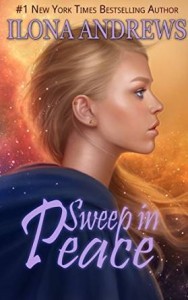 Sweep in Peace by Ilona Andrews:
Sweep in Peace by Ilona Andrews:
Dina DeMille doesn’t run your typical Bed and Breakfast. Her inn defies laws of physics, her fluffy dog is secretly a monster, and the only paying guest is a former Galactic tyrant with a price on her head. But the inn needs guests to thrive, and guests have been scarce, so when an Arbitrator shows up at Dina’s door and asks her to host a peace summit between three warring species, she jumps on the chance.
Unfortunately, for Dina, keeping the peace between Space Vampires, the Hope-Crushing Horde, and the devious Merchants of Baha-char is much easier said than done. On top of keeping her guests from murdering each other, she must find a chef, remodel the inn…and risk everything, even her life, to save the man she might fall in love with. But then it’s all in the day’s work for an Innkeeper…
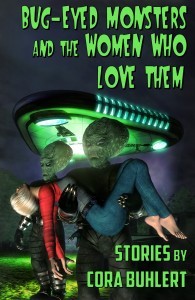 Bug-Eyed Monsters and the Women Who Love Them by Cora Buhlert:
Bug-Eyed Monsters and the Women Who Love Them by Cora Buhlert:
Six short science fiction stories that subvert the tropes and clichés of the golden age and caricature the gender dynamics of classic science fiction.
In these pages, you’ll travel from suburban America to the farthest reaches of the galaxy. You’ll visit New Pluto City and Garrett’s World. You’ll encounter the terrors of the Brazilian jungle and the horrors of American suburbia. You’ll meet phantom lovers and alien she-devils, devious man-eaters, unseen underwater monsters and the tentacled menace of the fearsome Eee’chuk-chi’up. You’ll encounter dashing space heroes who don’t get the girl and bug-eyed monsters that do. And you’ll meet intergalactic heroines who know exactly what they want from a lover.
This is a collection of six satirical science fiction stories of 7700 words or approximately 26 print pages altogether.
 The Vintages by Andrei Cherascu:
The Vintages by Andrei Cherascu:
Ten years after the doomed mission to Carthan, a terrible disease is turning human Mindguards into a threat to society. The Enforcement Unit, the ruthless, peace-keeping arm of the Interstellar Federation of Common Origin, has outlawed their activity and is keeping them under strict surveillance.
Forty-seven prototech Mindguards who call themselves the Vintages have fled to the Hando Desert and seized control of the territory’s thoughtenhancing drug trade. Under the leadership of the mysterious Jaycen Nemeth, the Vintages are rapidly becoming a danger to the IFCO, bringing them into direct conflict with the Enforcers. As Nemeth’s influence grows among the Desert Dwellers, the prospect of a new Mindwar threatens the future of mankind.
This is the sequel to Mindguard.
There’s a hideous monster on the loose, crushing heads and taking names.
But Detective Calvin Kinsey is on the case!
Two years ago, Cal Kinsey was an up-and-coming cop in the Aurora Police Department. But during a fateful nighttime stakeout in search of a prolific killer, Cal witnessed the darkest corner of his dreams come to life. A rogue vampire slaughtered his partner—to put it nicely—and introduced Cal to the supernatural world he never knew existed in the shadows.
Now, Cal is a newly minted detective at the often mocked Department of Supernatural Investigations. By day, the agents of DSI are called “Kooks” by local law enforcement. By night, they’re known as “Crows,” reviled by the supernatural underworld.
Mere weeks out of the academy, Cal catches his first real case, a vicious murder at a local college. An unknown sorcerer has summoned a powerful creature from the Eververse, a realm of magic and mayhem that borders Earth, and set it on a dangerous warpath through the city.
Between butting heads with his grumpy team captain, stirring up ill will with the local wizards and witches, and repeatedly getting the crap beaten out of himself, Cal must find a way to stop the Eververse monster and send it back to the hell it came from…
…preferably before Aurora, Michigan runs out of coffins for the dead.
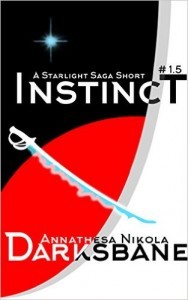 Instinct by Annathesa Nikola Darksbane:
Instinct by Annathesa Nikola Darksbane:
Instinct can save your life. Ignoring it can get you killed. And sometimes, it can uncover things perhaps best left alone.
After the escalating series of events on Urzra, Captain Branwen Hawke’s crew is on leave, enjoying a vacation at the behest of the Kalaset itself. But for Branwen, the conflict on Urzra may have reawakened in her a desire for action that she fought for years to put down.
A chance encounter devolves into bloody violence, and without the support of her crew, the Captain ends up in a heated struggle for survival on her own as her instincts discover a danger hidden in the heart of Incarnum that may leave her dead, or worse.
 Omega Trouble by Eileen Glass:
Omega Trouble by Eileen Glass:
Alluring but barren, omega is an unfortunate affliction Skye is trying to outrun. He gets away with it for several years, fleeing to a new city whenever the wolves get too close, but his survival mechanism creates a terrible, unforeseen result. By dodging and ducking every rogue alpha to approach him, the one that finally keeps up is the size of a truck. Liam is not a wolf to be disrespected, and Skye is all too aware of his place in the pack. Natural selection has never been kind to him.
But, strangely, Liam sort of is.
Trouble is a novella of about 26,000 words.
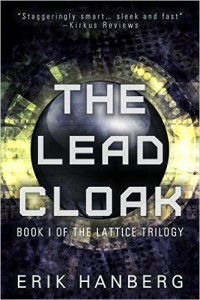 The Lead Cloak by Erik Hanberg:
The Lead Cloak by Erik Hanberg:
Byron Shaw can track and find anyone on Earth. Except the people who tried to kill him.
By 2081, privacy no longer exists. The Lattice enables anyone to re-live any moment of your life. People can experience past and present events—or see into the mind of anyone, living or dead.
Most people love it. Some want to destroy it.
Colonel Byron Shaw has just saved the Lattice from the most dangerous attack in its history. Now he must find those responsible. But there’s a question nobody’s asking: does the Lattice deserve to be saved?
The answer may cost him his life.
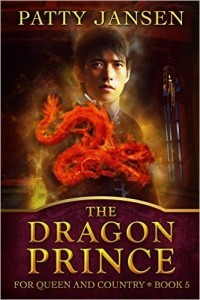 The Dragon Prince by Patty Jansen:
The Dragon Prince by Patty Jansen:
The tyrant Alexandre is gone from Saardam, but a new menace has come: the eastern traders in a ship of metal that is said to have been forged with dragon magic. They bring a chest of gold to buy an office in the city.
The people don’t want them in their town. The Church of the Triune, which forbids magic, has increased its hold on the population, despite the Red Baron’s efforts to stamp it out.
Newly-crowned queen Johanna is staring into the empty coffers after the extravagant spending by her husband’s father before his death. King Roald is off in the garden to catch frogs, and she faces condemnation by the church in the knowledge that Saarland will need both money and magic to defeat the Red Baron’s army.
 Flight to the Fort by Jim Johnson:
Flight to the Fort by Jim Johnson:
The Scales Are Out of Balance
Tjety, an exiled Ranger of Mayat, and Ruia, a young fisherman’s daughter, team up to guide the survivors of a bandit attack through the dangerous and rugged Kekhmet frontier. Can they reach the safety of Fort Sekhmet before foul cultists and their horrible mummified creatures can capture them?
Flight to the Fort is the second episode in PISTOLS AND PYRAMIDS, an all-new monthly series best described as an ancient Egyptian-themed weird western with magic. And mummies. Lots of mummies.
This book contains some profanity and depictions of violence. Reader discretion is advised.
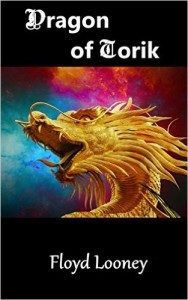 Dragon of Torik by Floyd Looney:
Dragon of Torik by Floyd Looney:
Short Story & Bonus Story
Four heroes run an errand for the Prince of Archlandia, heir to the throne, because the King is mad and cannot do the job himself. There is a report that the peppercorn workers of Torik are afraid to work because a dragon has appeared and people went missing. The prince has tasked the three large warriors and the slightly built archer to ferret out the truth of these reports. Alas, before they even arrive… trolls!
BONUS
Marwyn the dwarf has a tough life at the bottom of the ladder, except for gnomes, as a servant to a mean old witch. Until he is approached about a mission to save someone from the clutches of a dragon.
 Preserving Eternity by Mercia McMahon:
Preserving Eternity by Mercia McMahon:
In an alternate Asia the Fumetsu are a Japanese-style culture of immortal beings, who live among mortal human races based on Sri Lankan, Ainu, and Korean style cultures. Life is tough in their city-state of Chieshi, which exists to protect the mountain on which the older Fumetsu live.
Mayu is a champion in the sport of women’s sword fighting and a once in a generation talent. She is also a keen advocate of women’s rights, who wants to cross over to the mountain and change society through politics. Then a rebellion happens and she has to decide how best to pursue her aims: by diplomacy or by the sword.
As the Fumetsu are eternally fertile relations between men and women are banned on the mountain, but compulsory in the city. Mayu’s dilemma is complicated by the love of her life and fellow swordswoman Yaeko already living on the mountain, and the rebellion could separate them for ever.
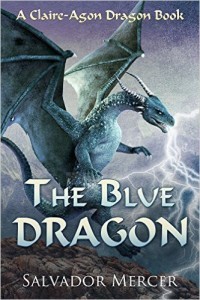 The Blue Dragon by Salvador Mercer:
The Blue Dragon by Salvador Mercer:
A thousand years ago, on the world of Claire-Agon, a war raged between men and dragons.
After an expedition of elite warriors kills an ancient nemesis, Seth the Sword Slayer, one of Agon’s most feared assassins, finds himself in the middle of a mysterious string of killings targeting the members of his elite group.
As the Kesh wizards call a conclave of Agon’s most powerful realms to Balax, the capital of Balaria, Seth attempts to set a trap and kill the rouge assassin in his homeland with the help of the governor’s troops, the thieves’ guild and his own assassin’s order. Seth must not only save his city from a new threat of destruction, but also navigate the politically deadly waters of high intrigue from the gathered realms.
Seth soon discovers that, in the world of Claire-Agon, when dealing with a Blue Dragon, sometimes appearances can be deceiving.
 Time Junkie by Nigel G. Mitchell
Time Junkie by Nigel G. Mitchell
“My name is Timothy McGill, and I’m a time travel addict.”
Tim was just your usual frustrated and isolated teenager until he stumbled across krono, a new drug which sends him back in time while he trips out. From the moment he first tries it, Timothy begins a downward spiral into crime and corruption, all while living through the moments that led to his addiction. It’s a strange and thoughtful journey as Tim explores his past while trying to grapple with the present and determine his future.
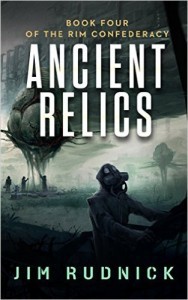 Ancient Relics by Jim Rudnick:
Ancient Relics by Jim Rudnick:
“Taking on a new Captaincy with the Barony means that our Captain Scott can now live a life of ease. His drinking will be tolerated, his hangovers ignored and he will be in charge of the newest fastest Supra Destroyer in the RIM Confederacy.
Life is good for Tanner who enjoys his new ship and the favors of the Lady St. August yet the PTSD he still suffers from the thwarted prison escape on Halberd still haunts him. He copes but needs support from loyal friends and that keeps him going.
Except he soon learns that the simple task of doing his shakedown cruise on the BN Atlas means that he inadvertently finds a discovery that will shake the very foundations of science all across the galaxy.
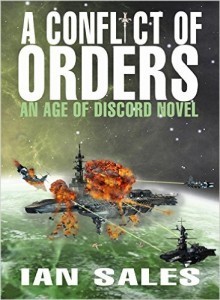 A Conflict of Orders by Ian Sales:
A Conflict of Orders by Ian Sales:
Casimir Ormuz and the Admiral, at the head of the biggest fleet the Empire has seen since its founding, are on their way to Geneza to meet the forces of the Serpent.
On Shuto, capital world of the Empire, the Serpent has begun his siege of the Imperial Palace.
Ormuz and the Admiral must win their battle on Geneza, and then travel to Shuto to save the Emperor, to save the Empire. But winning the fight and lifting the siege are only the beginning. Still complicating matters is the millennia-long conspiracy which seems to be driving the Serpent’s rebellion.
So who is the real villain?
And when it all ends, who will be sitting on the Imperial Throne?
 Rabbit Trails by Hollis Shiloh:
Rabbit Trails by Hollis Shiloh:
Logan is a lonely, nervous rabbit shifter — until he meets teasing, gentle Gabe. He’s so drawn to Gabe that he’s frightened about what that means for him. Gabe might be funny and sweet, but he’s also friends with wolves, and he has his own sadness beneath the goofy surface. Can they make a relationship work? Do they even dare try?
31,000+ words
sweet gay romance
set in the same world as the “Shifters and Partners” series but can be read alone
 Send to Kindle
Send to Kindle
November 25, 2015
More on Amazon’s problematic “Man in the High Castle” ads
The video included with the article gives a closer look at the subway car in question, which has been transformed into an ad for The Man in the High Castle inside and out. It also shows that the symbol held in the claws of the Reichsadler is not in fact a swastika as I had assumed from the photos posted online, but an Iron Cross, which unlike the swastika is not illegal in Germany nor elsewhere. It doesn’t make the ad campaign any less tasteless, especially since both the eagle insignia (though modified from the Third Reich version) and the Iron Cross are still in use in modern times. The eagle, which actualy dates back to the Roman Empire, is still the state symbol of the Federal Republic of Germany, though the modified modern version is called Bundesadler, i.e. Federal instead of Imperial eagle. And the Iron Cross, which dates back to the Medieval insignia of the Teutonic Order, is still the official logo of the German army.
According to the article, the New York City transport authority clearly wasn’t happy about the ads, but had no power to do anything about the ads, because they have no right to reject ads, unless they disparage an individual or group. Which isn’t bad as a policy, otherwise you’d get rejections of e.g. atheism ads or safer sex ads or birth control ads, too, because someone felt offended by them.
But what stuns me most about this whole affair is how whoever does the ad campaigns for Amazon could ever have thought that plastering modified Nazi and Imperial Japanese symbols all over subway cars in New York City of all places, a city which is home to one and a half million Jews as well as one million Asian Americans as well as 250000 people of German ancestry, was a good idea. It wasn’t just obvious that this advertising campaign would offend a whole lot of people, it almost seems to have been designed that way. Especially since it’s not just a poster or an ad banner, it’s a whole subway train redesigned inside and out.
Talking of which, is it normal in the US that entire trains are covered in themed advertising inside and out? Cause here in Germany, we do have the occasional themed train such as this neat example of a Bremen tram repainted to celebrate the local football club Werder Bremen or this one which advertises an ecological project. But themed trams are fairly rare, most just have regular ad banners. And the theme never extends to the interior.
In fact, I wouldn’t be surprised if Amazon did not mind the controversy at all, because it got plenty of people talking about The Man in the High Castle and raised awareness of the show among these who hadn’t heard about it yet. In short, they got some extra publicity for the show out of their pretty tasteless ad campaign.
However, by all accounts The Man in the High Castle is good enough that it doesn’t need tasteless advertising and deliberately courted controversies to promote it.
 Send to Kindle
Send to Kindle
November 24, 2015
Some thoughts on Amazon’s problematic ad campaign for “The Man in the High Castle”
The US genre sphere is currently awash with discussion of new SFF TV and streaming video shows, which makes me quite jealous, since it’s the TV doldrums over here in Germany at the moment. But from my US friends, I hear eager debate about Jessica Jones, Into the Badlands, The Man in the High Castle and The Expanse.
I’ll have more to say about Jessica Jones (which I enjoy a lot two episodes in) in a future post. And for other people’s commentary on these various shows, check out my weekly link round-up every Friday over at the Speculative Fiction Showcase.
But for now, I want to talk about the other streaming video series that has everybody excited, namely The Man in the High Castle, based on the eponymous Philip K. Dick novel.
Now I’m not going to watch The Man in the High Castle, because I intensely dislike alternate histories set in worlds where the Nazis and/or the Japanese won World War II. I go a bit deeper into the reasons why I dislike that particular trope (and it is a trope and a very hackneyed one at that) in this post on a completely different TV show. But in short, I don’t like “The Nazis win WWII” alternate histories, because they tend to be illogical, full of anachronisms due to bad research and often just plain offensive.
Now the original novel The Man in the High Castle is actually one of the better takes on the idea. Nor is it offensive, which surprised me considering that I have read some massively offensive work by Philip K. Dick (“The Pre-Persons” is nearly on a level with Randall Garrett’s “The Queen Bee” for misogyny and sheer offensiveness). Nonetheless, I’m not going to watch the series, because a) I’ve got enough shows to watch that I’m actually enjoying and b) the trailers I’ve seen didn’t actually fill me with confidence that the series would capture Dick’s novel well.
For starters, there’s way too much focus on Nazis, whereas the novel is largely set in Japanese controlled California and not in the Nazi controlled Eastern US. Though the production designer at least tries to avoid obvious anachronisms as the Misfits episode mentioned above, though I don’t believe that Communist East Germany is the best model for what a Nazi controlled America would look like. For starters, it was a completely different system, though there is some overlap between Fascist and Stalinist aesthetics. I’m also not convinced that there wouldn’t have been space age aesthetics in a hypothetical Nazi controlled America, especially since the Third Reich has space travel in the novel. But at least the production team are trying.
I’m a bit more worried by the fact that The Grasshopper Lies Heavy, the novel within a novel, an alternate history about how the Allies won WWII, which is explicitly not our timeline (yes, Dick actually answered the question I asked in the other post whether timelines where the Nazis won WWII have alternate history novels about the Allies winning), is replaced in the series by an underground movie featuring the usual WWII newsreel footage from our timeline. Though Paul Levinson seems to like the use of newsreels. And given Hollywood’s preference for formulaic storytelling, I’m pretty sure that Dick’s plotting by I-Ching did not make it into the series either.
Finally, there was the anachronistic music playing over the trailer (“Mad World”, a song from 1982 in the Gary Jules version from 2001, i.e. a song that likely wouldn’t exist in this alternate reality at all). Supposedly, the actual show also features “Edelweiss”, a sappy, faux-folksy song from the Rodgers and Hammerstein musical The Sound of Music, a work which again wouldn’t exist in the alternate timeline of The Man in the High Castle at all. Never mind that Germans and Austrians either don’t know The Sound of Music or dislike it, because we’ve had an IMO far superior version of the same story with Die Trapp Familie (available on YouTube here), which featured actual German and Austrian folksongs instead of the Rodgers/Hammerstein songs.
So in short, I’m not interested in watching The Man in the High Castle, though I have no problem with its existence. If anything, Philip K. Dick is due another decent adaptation of his work after the many lackluster attempts of recent years. I’m not sure if The Man in the High Castle is a decent adaptation and in fact I’ve got my doubts, as described above, but it’s got to be better than some of the other travesties visited on poor Dick in the past twenty years (Minority Report, anyone? Or how about Paycheck?).
So imagine my surprise when I went to visit Amazon.com (I shop via Amazon.de, but use Amazon.com for links) on Sunday night only to find myself faced with a huge screen-filling ad banner full of Nazi imagery, including a New York skyline festooned with swastikas and the Statue of Liberty doing a “Heil Hitler” salute. I did a doubletake and then realised that this was just as an ad for The Man in the High Castle. Which didn’t make visiting an e-commerce website and finding myself faced with Nazi imagery any less offensive. And I was lucky that I was at home and alone. Cause I really wouldn’t want to open Amazon’s homepage in a public place and have people giving me the side-eye, because they think that I’m looking at Neo Nazi sites. In fact, if someone should catch you looking at a site full of Nazi imagery at work, it might endanger your job, at least here in Germany. This is pretty much the definition of Not Safe For Work. Considering how strict Amazon is regarding even extremely mild nudity on book covers, I find it problematic
So I tweeted the following and largely forgot about it:
Honestly, Amazon, I understand you want to promote The Man in the High Castle, but finding your home page full of Nazi imagery is offensive.
— Cora Buhlert (@CoraBuhlert) November 23, 2015
Today then I got an e-mail from fellow indie SFF writer Marilyn Peake who sent me a link to a Mashable post and asked me if I’d seen it yet, since I was quoted therein. Turns out that the Mashable post by Patrick Culp was about Amazon’s ad campaign for The Man in the High Castle, which involved not just plastered its homepage with Nazi imagery, but also involved swastikas on the US flag and the Imperial Japanese banner emblazoned on the seats of New York City subway cars. Which is just… – okay, I have no words for that subway car. Though I find it interesting that people are sitting on the Nazi side in the photo, but not on the Japanese side. Cause I’m pretty sure I wouldn’t have sat down on the swastika emblazoned seats.
When I showed the photos of the subway car in the Mashable article and the Amazon ad banner, as displayed in the same article (since it seems to have vanished from Amazon’s homepage, thank goodness), to a German friend, she was quite literally speechless.
Visiting Twitter, I also found that my tweet had gotten a lot of views, likes and retweets. There were also a few replies, including a bunch by trolls who apparently decided to project their hatred of allegedly over-sensitive US college students (who seem to be the current pet hate of US rightwingers*) on me, which is pretty fucking ridiculous, because a) I’m not American and b) haven’t been a student in ten years or so. But I guess trolls can’t be expected to actually check out someone before typing abuse at them.
Besides, here in Germany there is an added issue with using Nazi imagery in advertising, since publicly displaying “symbols associated with organisations hostile to the German constitution” is actually illegal in Germany. There are exceptions for educational, critical and artistic purposes, hence historical photographs in school textbooks and movies about the Third Reich may use the swastika, the double sighel rune and other banned symbols. The series The Man in the High Castle itself would be covered by this exception as well, since it’s clearly a work of art.
Advertising, however, is not art and therefore Nazi imagery may not be used for advertising purposes, even for films and TV series about the Third Reich. Even posters for historical films about the Third Reich like e.g. Downfall usually avoid showing the swastika. And indeed the Amazon.de site uses a completely different swastika-free ad, which manages to be evocative without breaking German law or being offensive.
ETA: Paul Levinson also weighs in on the Amazon ad campaign.
ETA 2: And the swastika emblazoned subway cars are gone. Good riddance. Honestly, you can advertise this show without Nazi imagery.
*Personally I blame that “Coddling of the American mind” article, which The Atlantic pushes at every opportunity. Because the US obviously has no bigger problems than college students asking for trigger warnings.
 Send to Kindle
Send to Kindle
November 22, 2015
New science fiction collection: Bug-Eyed Monsters and the Women Who Love Them
I have another new release to announce and once again it’s a collection of short science fiction stories written during the July Short Story Challenge, where I wrote a short story per day in July 2015.
One thing I noticed while writing so many stories in such a short period of time was that my critical side completely shut down after a while and my creative side came out to play. As a result, I found myself writing a lot of unusual, parodistic or just plain weird stories.
Another thing I noticed is that certain themes emerged during the challenge. One theme was stories of lost worlds littered with abandoned technology that has long since become magic and legend (collected in Children of the Stone Gods). Another theme was really bizarre stories about aliens who look like anthropomorphic cartoon animals (collected in Operation Rubber Ducky). A third theme were stories about men, women and alien monsters, which usually turned out to be parodies of Golden Age science fiction with its retrograde gender dynamics.
These are the stories you can find in Bug-Eyed Monsters and the Women Who Love Them. In these pages, you’ll meet some prime bug-eyed monsters like the fearsome Eee’chuk-chi’up or the unseen terror of the Amazon (that’s the river, not the online vendor – and yes, I’ve had to clarify this). You’ll experience the hidden horros that lie beneath the peaceful facade of suburban America terrifying and see it invaded by aliens who want only one thing. You’ll meet the dashing Captain Crash Martigan of the rocket scout squad of New Pluto City as well as Captain Robert R. Garrett of the convict ship Perpetual Penitence, who really doesn’t like to be interrupted. And of course, you’ll everything about regulation No. 1.645 of the United Alliance of Planets handbook of space travel and colonisation (not to be confused with regulation No. 1.654, which is about personal waste disposal).
Word of warning: Men – at least human men – don’t get off very well in these stories, whereas women of any species and aliens – whether bug-eyed monsters or not – do. Plus, most of these stories contain sex, not very explicit, but at least one partner is definitely not human.
Bug-Eyed Monsters and the Women Who Love Them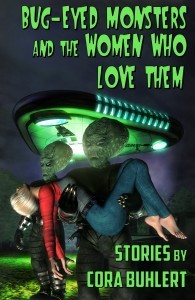 Six short science fiction stories that subvert the tropes and clichés of the golden age and caricature the gender dynamics of classic science fiction.
Six short science fiction stories that subvert the tropes and clichés of the golden age and caricature the gender dynamics of classic science fiction.
In these pages, you’ll travel from suburban America to the farthest reaches of the galaxy. You’ll visit New Pluto City and Garrett’s World. You’ll encounter the terrors of the Brazilian jungle and the horrors of American suburbia. You’ll meet phantom lovers and alien she-devils, devious man-eaters, unseen underwater monsters and the tentacled menace of the fearsome Eee’chuk-chi’up. You’ll encounter dashing space heroes who don’t get the girl and bug-eyed monsters that do. And you’ll meet intergalactic heroines who know exactly what they want from a lover.
More information.
Length: 7700 words
List price: 0.99 USD, EUR or GBP
Buy it at Amazon US, Amazon UK, Amazon Germany, Amazon France, Amazon Netherlands, Amazon Spain, Amazon Italy, Amazon Canada, Amazon Australia, Amazon Brazil, Amazon Japan, Amazon India, Amazon Mexico, Kobo, Barnes & Noble, Apple iTunes, Scribd, Oyster, Smashwords, Inktera, txtr, Thalia, Weltbild, Hugendubel, Der Club, Libiro, Nook UK, DriveThruFiction, OmniLit/AllRomance e-books, Casa del Libro, Flipkart, e-Sentral and XinXii.
 Send to Kindle
Send to Kindle
November 21, 2015
First Snow of the Winter 2015
I awoke this morning to see this outside my windows.

Snow on the meadow and carport.

Snowy street and neighbour house.

Snowy neighbour houses. Sadly, they still look ugly even with snow.
Of course, the snow is wet and probably won’t last. But still, this is the first snow of the winter 2015/16 in our region. Quite remarkable, since it was well over 15° Celsius only a few days ago.
 Send to Kindle
Send to Kindle
November 9, 2015
Das Literarische Quartett Reloaded, Take 2, or the State of Literary Programming on German TV
Don’t worry, I’m not planning to review every episode of the revived Literarisches Quartett, a literature discussion program on German TV (For more information about the program in general, see my review of the first episode of the revival here). But watching the second episode of the revival last night, featuring regular critics Volker Weidermann, Maxim Biller and Christine Westermann and guest critic Ursula Maerz, I realised that I have some more to say about this. The full episode may be watched online here BTW.
For starters, I’m still not sure whether we are truly witnessing the resurrection of Das Literarische Quartett like phoenix from the ashes or just an undead zombie version of the program shambling across the airwaves to suck out viewers’ brains. I’m hoping for the former, of course, but at the moment it’s looking more like the latter.
Lots of neepery about the program, Star Wars, Russian anarchists, Thomas Mann and German literature in general under the cut:
Though to be fair, I never watched the early installments of the original Literarisches Quartett, so I don’t know how long it needed to find its feet, though I remember that my highschool German teacher around the time the program debuted was less than impressed. However, the TV landscape has changed drastically in the twenty-eight years since the original Literarisches Quartett debuted and even public broadcasters like the ZDF no longer give programs as much time to find their feet as they did back in the 1980s. So even in its eleven PM graveyard slot, Das Literarische Quartett will have to provide ratings soon, since there is a bunch of more or less unfunny comedy programs nipping at its heels to nab yet another Friday night slot. And apparently, the ratings for the second episode were pretty bad, ditto for Neo Magazin Royale, the lone Friday night ZDF comedy program that’s actually funny on occasion, whereas the totally unfunny heute-show is getting good ratings.
Regarding the book selection, it seems the program took my criticism that the debut edition was somewhat dude heavy to heart (Well, I can dream, can I? Besides, if I noticed the dude heaviness, you can bet other people did as well), because the second episode featured two books by men and two by women. The selection was again nicely diverse and featured two German writers, one Israeli writer and one Russian writer. What is more, one book was non-fiction, another a thinly disguised autobiography (semi-fiction?), two were novels. Oh yes, and one of the books was originally published in 1909, i.e. over hundred years ago, though it has been newly translated into German. So in short, there was a nice range of different works discussed.
The books in question were Die Manns: Geschichte einer Familie (The Manns: History of a family) by Tillman Lahme, Alles zählt (Everything counts) by Verena Lueken, Das fahle Pferd (The pale horse) by Boris Savinkov and Schmerz (Pain) by Zeruya Shalev. All links go to Amazon.de, since except for Boris Savinkov’s autobiographic novel, none of the books in question even have an English translation.
Coincidentally, it seems as if every one of the four critics gets to pick a book to discuss, which is different from the selection process used by the original Literarisches Quartett, where someone from the production team selected the books. This might become a problem down the road, when the personal preferences of the critics start influencing the book selection too much. In fact, we are already seeing this, since it seems that Maxim Biller has a thing for dark and violent works, while Volker Weidermann pushed the biography of the Mann family, since that’s something of a personal interest for him.
However, what made the original Literarisches Quartett so compelling was not the book selection (though in retrospect they did pretty well picking future classics and award winners), but the interplay between the three regulars, since watching them argue was so much fun. Every one of the three regulars of the original Quartett had a very recognisable character to the point that I actually thought they were all playing roles. Hence, I was shocked when I realised that Marcel Reich-Ranicki and Sigrid Löffler really did hate each other.
By contrast, two of the three regulars of the new Literarisches Quartett remain terminally bland, while the third, Maxim Biller, desperately tries to channel Marcel Reich-Ranicki. Talking of which, in this photo from World Fantasy Con 2015, Gene Wolfe bears an uncanny resemblance to the late Marcel Reich-Ranicki to the point that it made me do a doubletake.
Maxim Biller got a lot of criticism, especially for his habit of interrupting others, when they were speaking. However, the interruption thing is mainly a moderation issue, since the nominal moderator Volker Weidermann simply doesn’t moderate very well. Marcel Reich-Ranicki handled the moderation duties much better in the original Literarisches Quartett and even managed to disagree with people (sometimes harshly) without interrupting them. Plus, he managed to turn random thunderstorms into literary jokes.
But whether you like Maxim Biller or not (I’m torn on that point), he’s at least entertaining and clearly relishes in his role as the acerbic critic. And so Biller was firing on all cylinders and had not very nice things to say about three of the four books.
For example, he called Verena Lueken’s novel about a woman with lung cancer “death porn”*, whereupon guest critic Ursula Maerz countered, “No, it’s New York porn, since the protagonist is so enthusiastic about living in New York that she even puts up with the substandard and massively expensive American healthcare system just to live there.” This might have led to an interesting discussion, but unfortunately, the short 45 minute time frame did not allow for that.
Biller also had some not very nice things to say about the women’s fiction novel** Pain by Israeli writer Zeruya Shalev. More precisely, he called the novel, in which a woman is torn between her highschool love on the one hand and her husband and the father of her kids on the other “Zionist breeding propaganda”, because the protagonist eventually stays with her husband. In fact, I suspect part of the reason for Biller’s presence on the Literarisches Quartett is that he’s Jewish and can therefore criticise Holocaust novels as well as books by Israeli and Jewish writers without getting accused of Anti-Semitism. At at any rate, Biller also tore into a Holocaust novel in the last episode. The “breeding propaganda” comment is something I’d have loved to see discussed further, since I for one did not know that divorce is apparently more taboo in Israel than in other industrialised nations (unless Biller was talking crap, which is of course possible). But again, the short 45 minute timeframe prevented any in depth discussion.
Biller was more defensive about Boris Savinkov‘s autobiographic novel The Pale Horse, since he actually liked it***. Unfortunately, nobody else did and so we were back to arguing. The main criticism was that Savinkov’s protagonist, a Russian revolutionary terrorist modelled clearly after Savinkov himself, was a really horrible person.
At this moment, I shook my head and thought, “It’s really obvious you’re not genre readers.” Because as genre readers, we’re frequently asked to sympathise with or even cheer for characters who are not very nice people, including several who would be labeled terrorists if they existed in the real world. Every SFF fan has grappled with this issue, once they realised that not just Grand Moff Tarkin, a bunch of Imperial generals and several battalions of Stormtroopers died on the Death Star, but also hundreds of maintenance workers, low level clerks, kitchen personnel, prostitutes (Come on, you know that there has to be a brothel on the Death Star) and god knows who else. And we continue to grapple with it with every book we read and every movie we watch. Therefore, it’s odd to observe several clearly well read people who have apparently never come across this issue at all.
Finally, Ursula Maerz and Maxim Biller teamed up to slam Tillman Lahme’s biography of the Mann family, much to the chagrin of Volker Weidermann. “I feel I know more about Thomas Mann and his family than I know about my own”, Ursula Maerz said in an allusion to the fact that we’ve been inundated with biographies and non-fiction books about the Mann family and individual members thereof in the past appox. fifteen years. And in fact, when Volker Weidermann started introducing this “revolutionary new biography of the Mann family”, I also rolled my eyes and thought, “Oh, for goodness sake, how many more biographies does one (admittedly interesting) family need”? Okay, so this one apparently consults some never before seen letters of some members of the Mann family, though I find it hard to believe that at this point there is even a single shopping list of a member of the Mann family that has not yet been extensively analysed.
Meanwhile, Maxim Biller decided to make it very clear (repeatedly) that he really, really does not like Thomas Mann. He called Mann a hypocrite, mostly for the fact that he was a closeted gay man as well as for his defence of World War I in Betrachtungen eines Unpolitischen (Reflections of an Unpolitical Man). Coincidentally, this also proved that Biller is not just (badly) channelling Marcel Reich-Ranicki, since the late Marcel Reich-Ranicki was a huge admirer of Thomas Mann and his work. I think we’re seeing a generational effect at work here, for Thomas Mann’s extremely detailed descriptions simply no longer match current writing and reading modes. Being made to read several of Thomas Mann’s novels and novellas bored me to death in school (if there was ever a writer who needed an editor, it was Mann) and my reaction to Reflections of an Unpolitical Man (which I was also made to read at school) was pretty much the same as Biller’s. I also find it troubling how often Reflections of an Unpolitical Man is swept under the rug considering Thomas Mann’s later 180 degree political turnabout.
Coincidentally, Biller also pointed out that Thomas Mann seems to have taken the place of Johann Wolfgang von Goethe as the quintessential German language writer. Now I’m not convinced of that point, though I do notice a significant difference in the way the Mann family is portrayed and discussed. For approx. twenty-five years ago, when I read their works in highschool, there was only Thomas Mann and his lesser known bother Heinrich (whom I’ve always preferred). I vaguely knew that there were other somewhat famous people named Mann who were related to Thomas and Heinrich, but they were never discussed. This also continued into my first years at university. There was Thomas, there was Heinrich, but none of the other Manns were even mentioned.
What changed all this was the TV mini-series/documentary drama (one of the first, in fact) Die Manns – Ein Jahrhundertroman (The Manns – Novel of a Century) back in 2001. The mini-series was massively successful, won several awards and was watched by pretty much everybody in Germany who considered themselves educated. It also put the rest of the Mann family, particularly Thomas Mann’s wife Katia, into focus for the first time. I remember that when The Manns debuted I thought, “Wait a minute, Thomas Mann had a wife? But wasn’t he – like – gay?”
The success of The Manns opened the floodgates for dozens of biographies of every single member of the Mann family. However, The Manns first aired fourteen years ago. And by now, the Mann family has been discussed extensively, so I agree with Ursula Maerz in questioning the need for yet another biography.
Though I found Maxim Biller’s dislike for the book interesting, considering that Maxim Biller shares a rare and highly questionable honour with Klaus Mann, one of the sons of Thomas and Katia Mann, namely having a novel officially banned in Germany for allegedly violating someone’s privacy rights. For Klaus Mann had his novel Mephisto banned for supposedly violating the privacy rights of actor/director Gustav Gründgens (Mephisto is a thinly veiled biography of Gründgens), while Biller had his novel Esra banned for allegedly violating the privacy of his ex-girlfriend and her mother. I vehemently disagree with both decisions and find it particularly troubling that the two novels banned by (West) German courts post 1945 were written by a gay man who was a victim of Nazi persecution and a Jewish writer respectively.
So let’s get back to the issue at hand, namely the new Literarisches Quartett. I’m not quite as harsh on the program as some of other critics, but there is definite room for improvement.
First of all, make it sixty minutes rather than forty-five, so that the discussions can become a bit more in-depth. Next, have someone other than the participants select the books, so the “My book is better than yours” dynamic is mitigated a bit. Cause honestly, these past two episodes the critics often sounded like Sad Puppies defending their Hugo candidates when presenting their book selection.
As for the three regulars, as much as plenty of people criticise Maxim Biller, at least he’s entertaining and produces memorable quotes, whether you agree with him or not. Meanwhile, Volker Weidermann and Christine Westermann are just terminally bland. Weidermann definitely needs to step up his moderation skills (and reign in Biller). As for Christine Westermann, what precisely does she offer except for TV experience in a completely different genre? In fact, I liked both guest critics, Juli Zeh in the debut episode and Ursula Maerz in this one, better than either Weidermann or Westermann.
Das Literarische Quartett is currently trading on the fame and acclaim of its predecessor. But that won’t last forever nor will it mask the fact that the ZDF’s literary programming has been lackluster ever since the original Literarisches Quartett went off the air back in 2001.
Lesen!, hosted by Elke Heidenreich, was the best and most successful of the ZDF’s many attempts to fill the void left by the Literarisches Quartett and lasted a full five years from 2003 to 2008. Alas, the ZDF fired Elke Heidenreich for daring to agree with Marcel Reich-Ranicki in criticising the low quality of German television in general and Thomas Gottschalk in particular (for more about Thomas Gottschalk, see this post and this one), while Reich-Ranicki got a special program to expound on his views, hosted by none other than Thomas Gottschalk. Yes, sexism was alive and well on German TV back in 2008.
ZDF had a couple of other literary programs after the cancellation of Lesen!, all of which were uniformly boring to the point that I cannot even recall the titles. Meanwhile, the best literary program on German TV is Druckfrisch, hosted by Denis Scheck who is the true heir to Marcel Reich-Ranicki’s brand of acerbic criticism**** and also pretty much the only genre-savvy critic on TV, who occasionally recommends Patrick Rothfuss or interviews George R.R. Martin. Alas, Druckfrisch runs on the rival channel ARD.
*To be fair, I’m not a big fan of books in which the protagonist either overcomes or dies of a serious illness either and there seems to be a proliferation of those at the moment.
**Both novels by women writers discussed in this episode were what is commonly called women’s fiction, which I found interesting, considering that so-called women’s fiction doesn’t normally get a lot of respect or critical attention in the US/UK.
***I’m sure Savinkov will be very comforted by that, considering he’s been dead since 1925.
****Scheck once called a sappy memoir “a literary abortion”.
 Send to Kindle
Send to Kindle
October 30, 2015
Indie Speculative Fiction of the Month for October 2015
 It’s that time of the month again, time for “Indie Speculative Fiction of the Month”.
It’s that time of the month again, time for “Indie Speculative Fiction of the Month”.
So what is “Indie Speculative Fiction of the Month”? It’s a round-up of speculative fiction by indie authors newly published this month, though some September books I missed the last time around snuck in as well. The books are arranged in alphabetical order by author. So far, most links only go to Amazon.com, though I may add other retailers for future editions.
Once again, we have new releases covering the whole broad spectrum of speculative fiction. We have quite a bit of horror (it’s Halloween, after all), science fiction, space opera, planetary romance, military science fiction, paranormal romance, science fiction romance, post-apocalyptic fiction, near future science fiction, epic fantasy, urban fantasy, historical fantasy, weird westerns, prison planets, interplanetary wars, lost worlds, were-bears, dragon shifters, aliens, zombies, immortal demon hunters, demons that feed on fame and fortune, wild west mages, Boston witches, biotech specialists, politicians moonlighting as necromancers and much more.
Don’t forget that Indie Speculative Fiction of the Month is also crossposted to the Speculative Fiction Showcase, a group blog run by Jessica Rydill and myself, which features new release spotlights, guest posts, interviews and link round-ups regarding all things speculative fiction several times per week.
As always, I know the authors at least vaguely, but I haven’t read all of the books, so Caveat emptor.
And now on to the books without further ado:
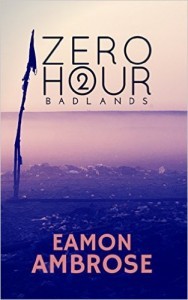 Zero Hour Part 2: Badlands by Eamon Ambrose:
Zero Hour Part 2: Badlands by Eamon Ambrose:
A soldier transformed begins a perilous journey with an unlikely companion to find answers in this thrilling continuation of the hit short story Zero Hour.
 Odd Tree Quarterly, edited by Joel Ansel:
Odd Tree Quarterly, edited by Joel Ansel:
Odd Tree Quarterly, your source for quality short fiction, presents its fantastic debut issue: a fabulous Halloween Special.
Featuring nineteen stories, a humorous essay and amazing art, this issue has much to offer the discerning fan of short fiction including:
Meet Mister Boogley by Jill Hand
Dean thought he could finance his dreams of making it as an MMA fighter by scamming the elderly Edna McGintley. How wrong he was. Because Edna’s not as defenseless as she seems: she has someone watching out for her. All the fighting skill in the world might not help Dean when he meets Mister Boogley.
Collateral Damage by Robert Stahl
A lethal threat literally hangs over the planet’s head and the outcome may hang on General Rex Perkins and his willingness to send his best friend, the most qualified person for the job, to die. Things are only complicated by the fact that his choice may not be entirely selfless.
The Girl on the Stump by jb raines
Ten-year-old Henry makes a new friend over the summer; a girl he meets near his home who spends her time siting on a stump, never speaking. As the long, bright days go by however, the question arises: is this girl real, or the mere flickering of childhood fantasy? Or is she something else entirely?
Don’t Be Afraid of the Lights by Die Booth
Thanks to a careless childhood prank, Bill has gone through his life with a debilitating fear of spiders. Luckily his wife, Barabara has the answer: a visit to the hypnotist Agnes Crawford. Full of hope to finally be rid of the source of his greatest anxiety, Bill is about to learn that to worst terrors don’t crawl about on eight legs–they live entirely in your mind.
Beer, Wine & Spirits by Jon Etter
Sharon’s Pub is a very special drinking establishment where one can come for a brew, a bite to eat–and directions to the afterlife.
Bill Ornette sets out from Sharon’s on a mission to confront his deceased wife over a past transgression he hasn’t forgiven her for. Along the way, he has to deal with the bad attitude of the boatman on the River Styx, a guy who bares a striking resemblance to Santa Claus, and something completely different from the airing of grievances he came for.
Also Fiction and Art By
Mark Mills, Lee A. Forman, Gillian French, Voss Foster, S.C. Hayden, Floyd Looney, Sarina Dorie, T.C. Powell, Kevin Bannigan Jr., Jon Chan, Benjamin Sperduto, Ross Baxter, Cassandra Ray-Stanley, Joel Ansel, and featuring original art by Jeremiah Morelli
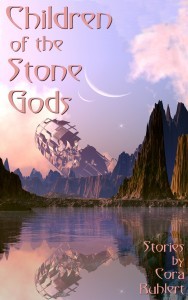 Children of the Stone Gods by Cora Buhlert:
Children of the Stone Gods by Cora Buhlert:
This is a collection of seven tales on the borderline of science fiction and fantasy. Seven stories of lost worlds, where carcasses of crashed spaceships litter the landscape and science and technology have long turned into myth and legend.
Enter a world of sacrifices and stone gods, where people live in the hulls of the great space arks that brought their ancestors to this planet, where four-armed assassins ply their trade and wandering priests warn of great cataclysms, where gods lie sleeping inside mountains and strange lights shine in the sky by night.
This is a collection of seven short science fiction tales of 12000 words or approximately 40 print pages altogether.
Ben Potter’s life is a shambles. As a journalist he’s hit rock bottom, writing dreck about monsters and ghouls to make ends meet after a big story blew up in his face. As a son he’s a disappointment, unwilling to follow his father, grandfather, and great grandfather into the family business. As a father, he’s mostly just not there.
Now a new assignment could change all that. All he has to do is go from London to the hills of West Virginia to investigate the strangest of stories his great grandfather told. Did a sleazy politician really raise the dead to try and win an election? And if he did, what happened to the zombies? Could they still exist? Ben needs to find out, to solve the mystery and find a way to get his life back on track.
But finding the answer only presents Ben with a whole new batch of problems. Does he use what he learns to put his life back on track? Or will he be compelled to do the right thing, even if it leaves his life a mess?
The hardest part of a mystery is deciding what to do once you’ve solved it.
 White Sky by Lara Campbell McGehee:
White Sky by Lara Campbell McGehee:
In a forgotten village on the windswept tundra of a small planetary colony, a young man called Jem is the only Sanndai. He knows nothing of his own people but the stories told by the Torvik villagers: stories of how the Sanndai came from the sky, bringing weapons that made people disappear, and banished the Torviks to this harsh land.
Now that Jem is grown, the elderly midwife who raised him can no longer protect him. Strong-willed and defiant, Jem struggles to prove his worth, but he’s shunned by most of the villagers. A man with mad eyes who seems to know something of Jem’s unknown past despises him most of all—a brutal man who could kill Jem without remorse.
If staying alive means leaving, Jem must have the courage to seek a new life outside the only world he has ever known—and to face the people he knows only from tales of their arrogance and cruelty.
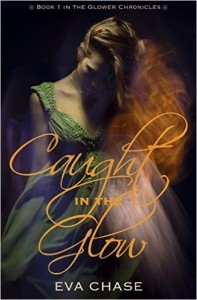 Caught in the Glow by Eva Chase:
Caught in the Glow by Eva Chase:
She’ll risk her heart to save his soul…
When she was a child, Avery Harmen watched her father die at the hands of a Glower—a breed of demon that feeds on dreams of fame and glory. Now she secretly protects the rising stars of Los Angeles from the demons that prey on them, determined to make sure her clients never suffer the same fate.
Then Avery finds herself assigned to Colin Ryder, a young indie rocker who just landed a major label deal. Colin is cocky, rebellious, a brilliant musician, and already in the Glowers’ sights. He’s also far too hot for Avery to ignore the chemistry between them—especially when she gets to know the tender side behind his celebrity facade. Though Avery knows she’s falling too fast, she’s willing to risk heartbreak if fanning the flames of attraction distracts Colin from his Glower-tempting antics. But Colin is keeping a secret of his own, one so big it will put both her heart and his soul on the line.
The first book in The Glower Chronicles, a steamy New Adult paranormal series.
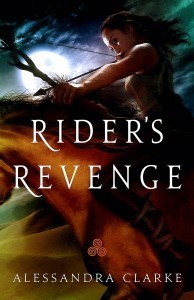 Rider’s Revenge by Alessandra Clarke:
Rider’s Revenge by Alessandra Clarke:
K’lrsa loves her life as a Rider for the White Horse Tribe. She spends her days hunting with her Amalanee horse, Fallion, and her nights avoiding her mother’s attempts to settle her down.
Even though there are hints that the world around her is changing, K’lrsa thinks her life is perfect.
Until the day her father is brutally murdered and she sets out to avenge him.
As she follows the vision the Great Father Sun showed her, determined to kill the man she thinks is responsible at any cost, even her own life, she’s haunted by dreams of a beautiful young man she can never have and a life she was never going to live.
Alone in a world vastly different from the one she’s known, she’ll have to decide: Avenge her father or follow her heart.
Will she succeed in destroying the Toreem Daliphate and killing the man responsible for her father’s death? Only the gods know.
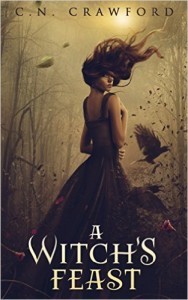 A Witch’s Feast by C.N. Crawford:
A Witch’s Feast by C.N. Crawford:
“There are new rules governing the country–namely, no magic. But Fiona Forzese has never been good with rules.”
After a ghostly army terrorized Boston, the Ranulf family say they’ll help Fiona and her classmates finish up junior year. They say their old Virginia plantation is a safe haven. All Fiona and her secret coven have to do is show up to a few math and English classes.
It should be a perfect solution. And it would be, if the Ranulfs weren’t members of a witch-hunting cult.
As Fiona digs deeper into the Ranulf’s past, she learns a dark truth that shocks her to her core. But it isn’t only the Ranulfs who are keeping secrets, and as the witch-hunting cult closes in, Fiona is forced to confront the demons of her own past.
In the year 2432, humans think they are alone in the universe. They’re wrong.
Commander Noa Sato plans a peaceful leave on her home planet Luddeccea … but winds up interrogated and imprisoned for her involvement in the Archangel Project. A project she knows nothing about.
Professor James Sinclair wakes in the snow, not remembering the past twenty four hours, or knowing why he is being pursued. The only thing he knows is that he has to find Commander Sato. A woman he’s never met.
A military officer from the colonies and a civilian from Old Earth, they couldn’t have less in common. But they have to work together to save the lives of millions–and their own.
Every step of the way they are haunted by the final words of a secret transmission:
The archangel is down.
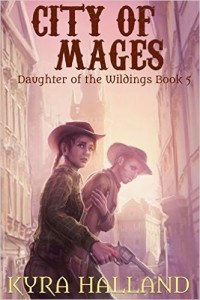 City of Mages by Kyra Halland:
City of Mages by Kyra Halland:
A nightmare come true – Silas is taken by mage hunters. Determined to rescue the man she loves, Lainie braves the perilous passage through the Gap to follow him and his captors into the mage-ruled land of Granadaia. There, she discovers a betrayal she never imagined and a deep-rooted conspiracy that threatens the safety and freedom of the settlers in the Wildings. Alone in a strange land, with no one she can trust, Lainie must find a way to free Silas and put an end to the danger facing their beloved Wildings.
This is book 5 of the Daughter of the Wildings western fantasy romance series.
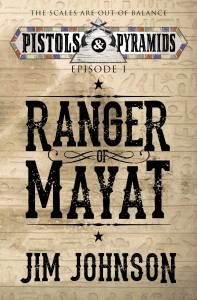 Ranger of Mayat by Jim Johnson:
Ranger of Mayat by Jim Johnson:
The Scales Are Out of Balance
When Tjety, an exiled Ranger of Mayat, discovers a ransacked village along the lawless northern Kekhmet frontier, he marshals his training and divine hekau magic to hunt down the ruthless cultists responsible for the attack. But can he find them before their prisoners are twisted into mindless slaves serving a necromancer bent on shattering the tenuous balance between order and chaos?
Ranger of Mayat is the first episode in PISTOLS AND PYRAMIDS, an all-new monthly series best described as an ancient Egyptian-themed weird western with magic. And mummies. Lots of mummies.
Heroes are not born, but forged.
A lone warrior takes up the cause of a hunted boy. A desperate nation seeks to bolster its fragile army. A malevolent god feasts on the nightmares of men and seeks to bring ruin to all.
The wanderer, Rayle, stands against the preternatural forces lurking on the edges of civilization and sanity. In the bleak lands of the Wrack, he rescues Bray from brutal men. Swearing to help the boy seek vengeance for the death of his brothers, Rayle finds himself locked in a savage contest that tests both his strength of arms and will.
The Younger Union, losing its long war against a tyrannical enemy is moved to enforce ancient contracts. Tensions build as an idyllic farming community becomes the stage upon which the future of the north will be decided.
When events collide, and a monstrous power threatens to drown their world in blood, Rayle and his unlikely allies must fight to stop the tides of carnage. To win they must first survive, and to survive they must overcome their fears, doubts, and regrets.
They must unite and set aside differences, and in doing so they may stand against the madness of The Sane King.
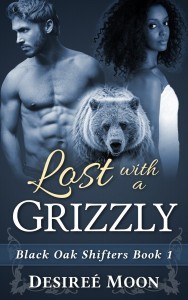 Lost with a Grizzly by Desirée Moon:
Lost with a Grizzly by Desirée Moon:
Out in the cold and escaping from a horrific past…
Nina Jacoby makes a desperate escape and runs away from her abusive past. When she stops to catch her breath, she finds herself in Black Oak forest. A home to shifters in the icy Alaskan wilderness. She meets Rafe Hart–a grizzly who runs a lumber yard nearby. Immediately, he’s entranced by her fuzzy curls, and luscious curves–eager to seek out a mate. But not if his brother Axle has anything to say about it!
Axle can’t stand Nina and her weak-puny-human ways. The two of them hate each other instantly, but slowly Nina starts to chip away at his ice-cold heart. Nina’s about to find out that living with grizzlies is not as easy as it seems. With these two bears at her beck and call, just how will poor Nina keep herself warm through those snowy winter nights?
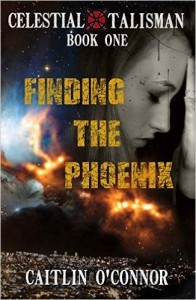 Finding the Phoenix by Caitlin O’Connor:
Finding the Phoenix by Caitlin O’Connor:
Descended from humans and a vanished race of elemental beings, only the Awakened know the truth about our world. Only they can hold back the fanatic Handmaidens of the Skaath Diurga–shadow creatures born from an ancient betrayal.
However, the Circle of Awakened is incomplete without the Child of Heaven: a human destined to Wield the Spirit element. Before she can Awaken, she must die.
Heaven has no memory of dying, except the experience of death itself. It’s that memory, of a place called ‘The Between’, that convinces her the man claiming to be her Guardian might not be completely crazy. Besides, even crazy is better than the life she’s leaving behind to be the Circle’s Wielder of Spirit. All she has to worry about now is her training, and figuring out how to fit in with the Awakened.
Tragedy strikes when one of the Guardians is killed, and ulterior motives thrust Heaven into the middle of the Circle’s quest for justice. She’ll have to decide just how far she’ll go for the people she’s come to care about.
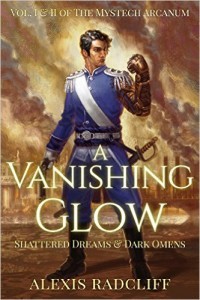 A Vanishing Glow by Alexis Radcliff:
A Vanishing Glow by Alexis Radcliff:
It is an Age of Revolution, an Age of Industrialism. Constructs, living men who are as much brass and steel as they are flesh, man the factories and wage the wars of a ruling elite who gorge themselves on the fruits of the common man’s labor. Mystech, a brilliant fusion of magic and machine, gives rise to a new class of privileged inventors and merchants even as the country festers with wounds from decades of internal strife.
Only one man holds the promise of a brighter future: Nole Ryon, the crown prince. When his childhood friend Jason Tern answers his call for aid, the two of them set out to fight for the change their country needs in order to survive, even as shadowy foes frustrate their efforts. But soon, Jason and Nole’s idealistic mission of hope becomes a furious manhunt for a political murderer as the nation balances on the precipice of a country-wide civil war. Can they cut through the threads of intrigue to discover their true enemy before everything is lost?
Sweeping from the ancient cities at the heart of the nation to the dusty edges of the war-torn frontier, A Vanishing Glow tells a tale of lords and ladies, soldiers and assassins, friends and lovers, who come together in a time of epic struggle. Here a brave officer risks everything to win back his estranged father’s respect; a brilliant young engineer attempts to atone for her sins; a war-weary commander tries to pick up the pieces of the life he lost; and a man touched by the gods struggles to prepare a nation for the coming of an ancient evil which only he can see. In the dying light of a once-prosperous society, amid twisting plots, suffering and betrayal, lost love and shattered dreams, all must fight for what they hold dear. Who will taste the fruits of victory and who will lie bloodied on the ground in the light of a vanishing glow?
“After a failed planetary rebellion, the rebel leader and his men are all given life sentences on Halberd, the RIM Confederacy prison planet and sent to the maximum island penitentiary—a prison that has never had a successful escape.
And under his Admirals orders, Captain Tanner Scott has also been sent to do RIM Navy duty on the planet with the mission to give up his alcoholism dependency. While he knows that this is what is expected of him by the Admiral, he finds it more difficult to do that he’d ever imagined.
Tanner meets a woman—the sister of the rebel leader and while he falls in love with her, he is not sure that the feeling is mutual. Yet he tries to straighten out his life and his drinking but instead he is faced with the choice of a lifetime—love or death.
Against incredible odds in the middle of a prison planet escape, he makes his choice . . . and more than his own life depends upon that choice . . . forever changing the future of the RIM!”
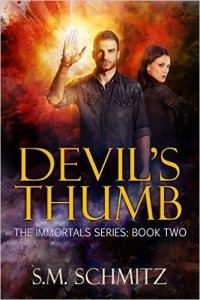 Devil’s Thumb by S.M. Schmitz:
Devil’s Thumb by S.M. Schmitz:
After a fateful decision in Baton Rouge, Colin and Anna move to Boulder where they hope they will get some much needed time off from hunting. But the demons who wanted retribution in Baton Rouge have followed them, and this time, they’re not alone.
This is the sequel to The Immortals.
 Beyond Regeneration by Jenny Schwartz:
Beyond Regeneration by Jenny Schwartz:
It’s complicated. Charley Rowdon knew Dr. Jack Bradshaw years ago, before the accident, before she lost her left arm. Before her husband died. Jack is an internationally respected regeneration specialist, and he’s just made the breakthrough of the century: using QNA to grow non-human bio-enhancements on people, including himself. Think superhuman senses, claws, and even, wings.
However, when, as a journalist, Charley accepts Jack’s invitation to accompany him to his private clinic, a luxury resort on the beautiful south west coast of Australia, she finds more than medical science and altered humanity.
Murder, espionage and a scientific development that Jack never ever predicted will challenge Charley to shed her grief and fear, and solve a mystery beyond imagining.
But as Charley regenerates her life, how much will she risk by loving again?
“Beyond Regeneration” is a novel of old grief and new beginnings. The science is fabulous, more fiction than fact, but the emotions are real. This is the story of a woman badly hurt by life who finds the courage to embrace the unbelievable, and love again.
 All the Things I’ve Lost by Hollis Shiloh:
All the Things I’ve Lost by Hollis Shiloh:
I am not from this world. I don’t know where I was from originally. When our pod landed, I was the only one to survive, and my memory was damaged.
That day, I lost the man I think I must have loved.
I don’t age, and I’m far too strong compared to these humans around me, but even so, I fear their finding out the truth about me. I try to protect the ones I can, but I am weak when it comes to saving them — or even just not hurting them by my ignorance and strength.
And now for the first time in decades, I’ve met a man like myself from another world — the world where we both hatched. I wonder what he can tell me about myself . . . and what I dare ask without giving away the fact that I remember nothing?
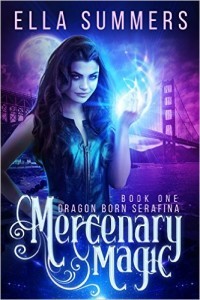 Mercenary Magic by Ella Summers:
Mercenary Magic by Ella Summers:
Long ago, the Dragon Born were hailed as the most powerful mages in the world. Today, they are condemned as abominations and have been hunted to near extinction.
Sera Dering has spent her entire life hiding her forbidden magic from the supernatural council who would kill her for the crime of being born. After years of drifting, she’s finally found a new life working as a low-grade mercenary for San Francisco’s oldest monster cleanup guild. She’s safe—as long as she pretends to be human.
But a dark and mysterious power is taking control of mages’ minds, and Sera’s guild sends her in to investigate. To save her city from a magical apocalypse, she must work together with a sexy and deadly mage who represents the very council that sentenced the Dragon Born to death. And if he finds out what she is, she’ll be next…
Mercenary Magic is the first book in the Dragon Born Serafina urban fantasy series.
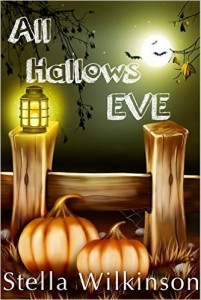 All Hallows Eve by Stella Wilkinson:
All Hallows Eve by Stella Wilkinson:
It’s Halloween and Eve is stuck babysitting a group of fourteen year old girls. When she tries to prevent them from performing some magical ceremony, the last thing she expects is to find herself trapped in the Underworld. Not only that, but she is apparently there as a date for The Lord of the Dead. The fact that he is hotter than Hades makes no difference to Eve, she knows she must resist his dark charm or she’ll never make it back to school on Monday morning.
A fun short story filled with Halloween folklore and mythology.
 Terminal Reset Omnibus: The Coming of the Wave by A.E. Williams:
Terminal Reset Omnibus: The Coming of the Wave by A.E. Williams:
Dr. David Harding Stared in the Mirror, and Could Not Believe What He Was Seeing!
Dr. David Harding is an Astrophysicist who discovers a mysterious force on a collision course with Earth. As The Wave hits our planet, its effects have devastating consequences. Governments topple. The world is poised on the brink of nuclear devastation. The effects are of an apocalyptic scale.
The ongoing strife between the countries of Earth, coupled with the ominous goals of an ancient scourge create a hazardous background.
Harding sets out with his catatonic wife to survive in this brave new world. But when his former lover and colleague, Dr. Tatania Golovanov, contacts him via radio, he is faced with choices he never expected to have to make.
The physical changes wrought by The Wave create massive upheavals in the traditional ways of previous generations.
Can these long ago lovers salvage their feelings from the ruins of a drastically altered world? Will Harding abandon the woman to whom he vowed his life? Will they all survive the daily challenges of living in a post-apocalyptic Earth the likes of which have never before been described in any science fiction story?
Terminal Reset is a story set in today’s world. Experience a world populated with complex characters, each learning to cope and adapt to the new reality imposed by the effects of The Wave.
 Send to Kindle
Send to Kindle
Back from Birmingham and some random pop culture musings
In case you noticed my absence, I’ve been away for a few days in Birmingham in the UK. I actually came back a couple of days ago, but I didn’t get around to blogging until now. Photos are forthcoming, but for now I’d like to talk about a couple of SF-nal things that happened while I was away:
I watched an current episode of Doctor Who – The Girl Who Died – and it was actually pretty good. Plus, it guest-starred Maisie Williams, the young actress who plays Arya Stark in Game of Thrones. In fact, I might have some more words about that later on.
Captain America – currently not Steve Rogers, who is taking a well deserved break, but Steve’s pal Sam Wilson, usually better known as Falcon – fought anti-immigrant racists (Can we have him smash up PEGIDA, please?) and decided to sever his ties with both the US government and SHIELD, because both are failing ordinary Americans. Predictably, some American conservatives led by Fox News were very upset about this. I guess they missed the time where Steve Rogers was so disillusioned by the Watergate scandal that he hung up his shield and took off his costume and went around calling himself Nomad, Man without a Country, for a while. Or any of the many other times before or after that had Captain America take a political stance to the left of the US Republican Party.
Captain America also further shocked certain Americans by kissing Thor on a gorgeous Alex Ross cover. Don’t get your hopes up, slash fans, it’s not Steve Rogers kissing Thor Odinson (though that would be awesome), but Sam Wilson kissing Jane Foster, who’d currently wielding the hammer, while Thor Odinson is taking a break. Still, Captain America – a black man – kissed Thor – a white woman – on the cover of a mainstream Marvel comic, which is pretty awesome. Now how long do we have to wait to see that in the movies?
At Wired, Amy Wallace offers a follow-up to her article about the 2015 Hugo controversy. It’s a pretty good article, just don’t read the comments.
Meanwhile,the Sad Puppies are still busily whining and rewriting history to suit their preferred narrative. Okay, that’s not exactly new, but the epic meltdown by this year’s spokespuppy in the comments is somewhat amusing.
Talking of SFF books, Birmingham is quite well-endowed with bookstores. In addition to the usual W.H. Smith and Waterstones stores (including gorgeous Waterstones in a repurposed 19th century bank building), Birmingham also boasts what appears to be the only Foyles bookstore outside London (opened only two weeks before I visited, too) as well as a big Forbidden Planet store, which had moved since I was last there and was somewhat hard to find (I even had to resort to asking likely looking people on the street to find where it had gone).
Now Forbidden Planet is mainly a store for comics, toys, t-shirts (I bought a great Dalek t-shirt) and general geeky stuff, but the bigger stores such as the flagship store in London and the one in Birmingham also tend to have a good selection of SFF books. And this particular Forbidden Planet was much better with regard to carrying SFF books by women writers than either Waterstones (okay, we know they’re crappy in that regard), W.H. Smith (somewhat less crappy, amazingly) and Foyles (not really the place where I’d go for SFF, whether by women or not, anyway).
Coincidentally, Forbidden Planet also carried a surprisingly amount of what I like to term “puppy fiction”, i.e. either books by prominent puppies and supporters (I spotted novels by Larry Correia, Sarah Hoyt, John C. Wright among others) or books by writers not affiliated with the Sad and Rabid Puppies, that nonetheless contain all the Nutty Nuggets that Puppies tend to enjoy including this year’s puppy nominee The Dark Between The Stars by Kevin J. Anderson*. I wondered about this a bit, especially since many of those books and authors (not Kevin J. Anderson, but others along those lines) are hard to find and little known in Europe. But then I realised that the abundance of Nutty Nuggets on Forbidden Planet‘s shelves was due to the fact that they carried a lot of imported US paperbacks, including a lot of Baen Books, which are normally hard to find in Europe. And Nutty Nuggets are more likely to appeal to American readers and Baen publishes quite a bit of it. But on the plus side, I also found a Sharon Lee/Steve Miller book (published by Baen) that had eluded me so far.
Finally, a new trailer for Star Wars: The Force Awakens has landed. Now as I’ve explained before here and here, I initially wasn’t particularly excited about more Star Wars (even though I’m as much a fan of the original trilogy as any geek who was a kid when they movies came out), because IMO that story has been told and it’s time for new stories. And besides, I’ve yet to enjoy anything that J.J. Abrams has wrought.
Hence I was pleased that I found myself rewatching the trailer a few times, because – hey, this looks actually good. But of course, some people were less than satisfied by the trailer for The Force Awakens, including a bunch of racists so angry that there are character of colour in Star Wars now (apparently, they missed Lando Calrissian, Mace Windu, Jango and Boba Fett, Bail Organa, Captain Panaka, Captain Typho and a couple of other characters of colour in the original trilogy and the prequels. Oh yes, and the fact that James Earl Jones provided the voice of Darth Vader) that they proposed a boycott that may or may not be intended seriously. Jessica Lachenal and Chuck Wendig weigh in and expose this boycott for the idiocy it is.
Talking of Star Wars, I even checked out the Force Awakens toys at Forbidden Planet, but alas, no Rey or BB-8 or even Gwendoline Christie’s character Captain Phasma. I did spot Finn and Poe Dameron and Kylo Ren, but the women (and the cute robot) were not available as usual. Yes, I probably should have checked out the Disney Store, especially since I passed one in Birmingham’s Bullring shopping center. But I’m still not used to the fact that Star Wars and Marvel superhero merchandise can now be found in Disney Stores of all places.
By the way, the Birmingham Forbidden Planet store has a big Yoda statue (I’d say lifesize, but the statue is actually bigger than Yoda) standing near its entrance. And while I was waiting at the cash register, I watched how a little girl stared at the Yoda statue and then told her mother, “Look, mummy, it’s a booger monster.” I and most other customers in earshot could barely contain their laughter, but the little girl actually wasn’t wrong. Because my then friends and I observed even thirty years ago that Yoda was the colour of snot.
*Wow, that book is hefty in physical form. I didn’t notice this when I got an electronic copy in the Hugo voters’ packet, but then I never finished that particular novel, because it wasn’t my cup of tea at all.
 Send to Kindle
Send to Kindle
Cora Buhlert's Blog
- Cora Buhlert's profile
- 14 followers


